#Finesse Mitchell
Explore tagged Tumblr posts
Text
“Forte was planking, face-down” 😂
#will forte#saturday night live#kenan thompson#late night with seth meyers#SNL#amy poehler#finesse Mitchell
3 notes
·
View notes
Text
Remembering O.J. Simpson 1947-2024
As I often need to say when posting a remembrance of people who did bad things, I separate the artist from the artists work. I say this at the onset of this piece.
O.J. Simpson, former NFL star and actor has died at 76. His entire life and career were completely overshadowed by his murder trial, which resulted in the 1995 acquittal of killing his wife Nicole Brown Simpson and her friend Ron Goldman. Here at Green's Party, I don't feel like talking about his trial, his controversy or even his sports career as this is a pop culture site. But if you want to know more about him I highly recommend the Oscar-winning documentary O.J.: Made in America.

Simpson, Leslie Nielsen, and George Kennedy in The Naked Gun
His NFL stardom made him into a celebrity. In addition to his multiple endorsement deals including Hertz, he acted in films and TV including Roots, a cameo in Back to the Beach, and as Det. Nordberg in the LOL funny comedies The Naked Gun: From the Files of Police Squad!, The Naked Gun 2½: The Smell of Fear, and Naked Gun 33 1/3: The Final Insult, which was released just a few months before his arrest.
There was a film he wasn't cast in: 1984's The Terminator. He was considered for the title role, but the studio feared audiences wouldn't believe someone as likable as O.J. was a killer. Ironic! In the years that followed, he became the punchline in so many jokes, i.e. Adam Sandler singing in his "The Chanukah Song", "O..J. Simpson, not a Jew". Or in Scream 2 when Randy is on the phone with the masked killer "You wanna be one of the big boys! Huh? Manson, Bundy, O.J."
O.J. hosted SNL in 1978, one of the early athletes to host. In the years that followed he was played by Tim Meadows, Finesse Mitchell, and Kenan Thompson on the show.
The link above is the obit from CNN.
#o.j. simpson#o.j. simpson: made in america#rip#roots#back to the beack#the naked gun#the naked gun 2 1/2#the naked gun 33 1/3#the terminator#adam sandler#scream 2#SNL#tim meadows#finesse mitchell#kenan thompson#film geek#tv#in the news
0 notes
Text
This is kind of a follow-up to this post about the Targtower brothers dynamic. I just love them. What`s not to love, honestly:

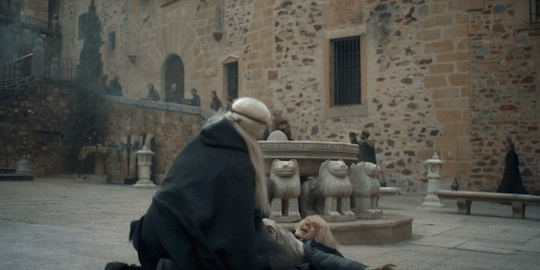
In that post I used the word 'lust' to describe a certain aspect of Aegon`s feelings towards his brother - but upon consideration I believe the word 'desire' to be more suitable. But what are the roots of these feelings and how do they and the form in which they are expressed change with time?
First things first:
1. Long post;
2. Nothing is this post is intended to promote or encourage sexual relations involving minors;
2. I enjoy both platonic (canon version) and romantic/sexual (fanon territory) interpretations of Aegon&Aemond relationship - without belittling any other pairing (canon or not) involving either of them. In fact I quite enjoy some of those other pairings as well.
So, the sensual side of the Green brothers` relationship is not the focal point of the show (or even of their relationship in general) by any means. And it`s not a simple 'I just want to bend you over the nearest piece of furniture and give it to you' thing from Aegon`s part either. It`s deliciously subtle and quite complex even from the beginning of their interactions we see - and it gets even more complicated as they transition into their adulthood.
Teen Aegon is a flirt in general. But when it comes to his brother the flirting intensifies - and begins to resemble 'pulling pigtails'. It`s in the spirit of mockery but one heavily tinged with fondness - and other feelings, deeper and heavier.
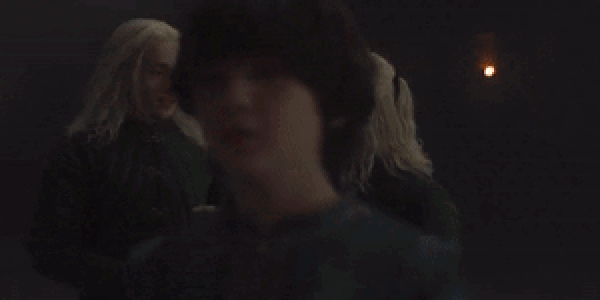

It`s the way Aegon's focused on Aemond - to the point that it feels like they are alone, even with other people in close vicinity. This focus doesn`t dissolve even when Aegon looks elsewhere.

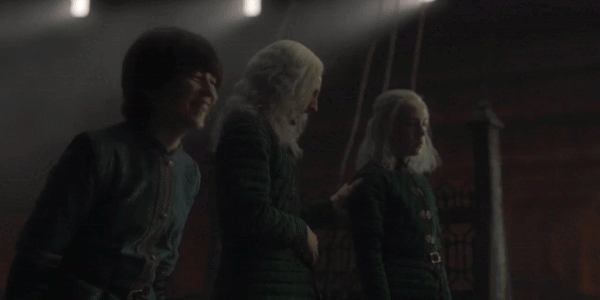
It`s in the way Aegon touches Aemond: seemingly carelessly - but there is a kind of hesitance, almost shyness, about his touch. Huge props to Ty for his acting: the not-exactly-platonic undertones are there, yet the vibe doesn`t feel gross in the slightest (the way it might have felt if acted out with less finesse, given the fact that Aemond is a minor after all, and so is Leo) - if anything it`s endearing. And I believe it feels this way because the roots of Aegon`s feelings are not sexual after all.
To Aegon, Aemond is a mystery: he`s his likeness yet his antipode, he`s so close yet so far. He can`t get a full grasp of him however much he tries. Aemond is like some rarity, a mystical object created by the Warlocks of Qarth, the one he wants to dismantle and see how it works but doesn`t dare to do it since he might not be able to put it back together. But first and foremost Aemond is Aegon`s brother - his blood, his companion; the one he wants to feel close to, the one he wants to be like him and tries to achieve it in any way he can - hence the trip to the brothel. It certainly wasn`t a nice thing to do, and Aegon`s train of thought there might have taken various directions at once, but ultimately I don`t think it was about corruption or causing Aemond discomfort but about unity, companionship, feeling close, alike and one - the things Aegon chased after and was deprived of.
A crack-ish side note: Aegon telling Aemond he fancies creatures with 'veeery long legs' with this playfully lecherous grin on his face -
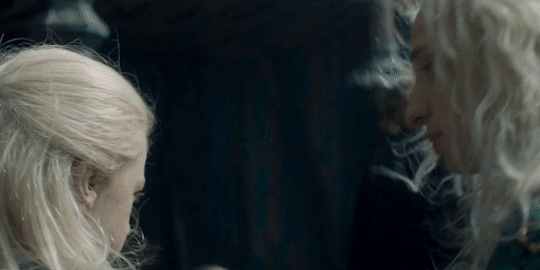
-has never not been funny to me since the moment I realized that adult Aemond, courtesy of Ewan Mitchell`s gorgeous physique, might just have the longest legs among all the characters (or at least he`s damn close to the top).
As the brothers grow up so do Aegon`s feelings.
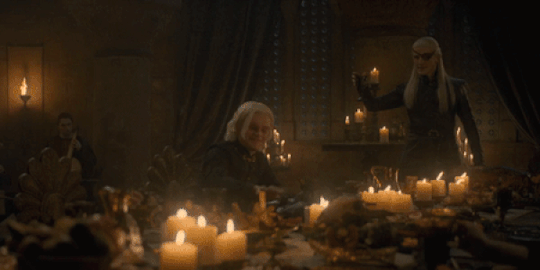
Both curiosity about the intricacies of their similarities and differences and deep desire for true company and understanding are still very much there. But now there is also so much more. Guilt and shame over not being by Aemond`s side when he needed it most - and seeing a reminder of this on his brother`s face every damn day. Protectiveness that seems misplaced nowadays, but that`s not always the case: Aemond will need Aegon`s support after what happened at Storm`s End - if only he allows himself to accept it. Admiration and envy - about how strong and brilliant his little brother has become, how right he`s turned out to be in contrast with Aegon`s perceived wrongness. And it all comes to a head during the chase and fight scene in episode 9.
A lot of people mentioned that they expected the Targtower brothers to kiss when Aegon pleaded with Aemond to let him go. Well, that`s entirely understandable given that we have this shot:
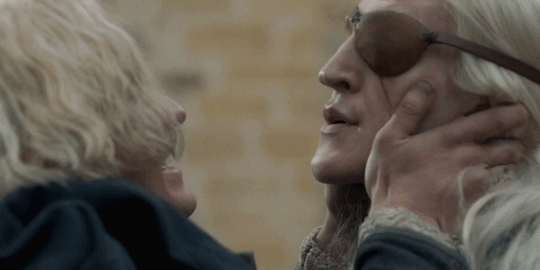
TGC`s eyes did not just slip there, after all: such things are not done at random, it was a conscious acting choice. And I`m pretty sure Aegon would have indeed kissed his brother if not for Criston intervening and breaking the spell of the moment. Because while under this spell Aegon saw Aemond for everything that he`d ever been to him: his playmate and his toy, his judge and his closest human friend, his solace and his torment - and, perhaps the most important thing right then, his freedom. For years Aemond truly was the personification of the fate Aegon wanted to have - being the second son, free of the burden of the future rule, of excessive expectations, of torturous scrutiny. But also in that moment Aemond literally became Aegon`s freedom, or his best chance at getting it. And so, Aegon was ready to kiss his little brother goodbye - and at the same time kiss his freedom in greeting. But, alas -
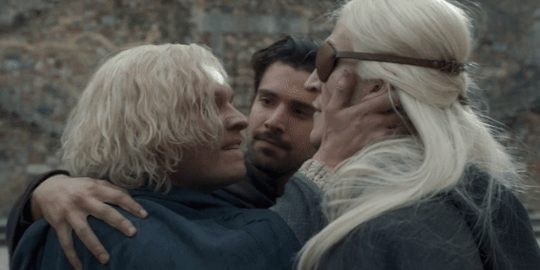
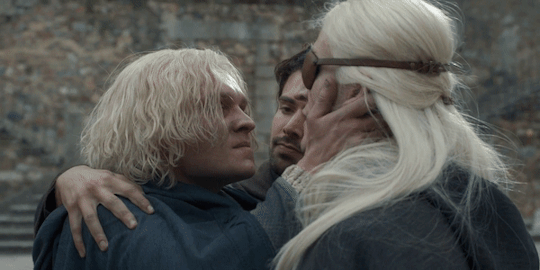
-in a few seconds freedom slipped away, and Aegon let go of it - let go of his brother, never tearing his eyes away until the very last moment.
Just look at his face, it`s all there (Tom, you are a genius).
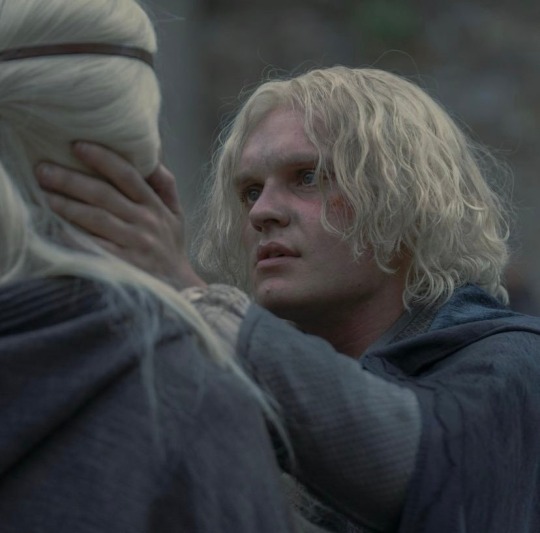
Also, at the risk of sounding like a broken record: Tom and Ewan`s chemistry is everything. In a notably short amount of screen time they shared they have managed to give life to an astoundingly authentic, layered and compelling sibling bond that outshines pretty much every other (not that there is a competition going on but still).
To try and sum all of it up, it`s not that Aegon wants to fuck Aemond - it`s that he wants Aemond, period. And that want, need, desire can take many forms and include many things. Their relationship is complicated, dramatic and wholesome with a side of fucked up - but absolutely beautiful. And I, for one, love it to pieces.
@the-girl-in-the-box here you are!:)
#aegon ii targaryen#aegon the elder#aemond targaryen#aegond#aegon x aemond#tom glynn carney#ty tennant#ewan mitchell#leo ashton#house of the dragon#hotd#hotd meta#green brothers#targtowers#targtower brothers
278 notes
·
View notes
Text

It could have been the year of Sue (and Brad).
Six years after ABC passed on an offshoot of the long-running family sitcom The Middle, would-be spinoff stars Eden Sher and Brock Ciarlelli (aka Sue and Brad) are telling fans what they would have seen in the show, which at one point went by the working title Sue Sue in the City.
The pilot, ordered by ABC in August 2018, would have seen Sher reprise her breakout role as Mike and Frankie’s daughter, Sue Heck, as she leaves Orson, Ind., to pursue a career in Chicago, Ill. The Middle creators Eileen Heisler and DeAnn Heline penned the script, and were set to serve as executive producers. Alas, the Alphabet network decided not to move forward with the show.
“We did film it, and it was pretty devastating when it didn’t go,” Sher says in the Instagram video below. “We were all… pretty shocked, to be honest.” Adds Ciarlelli: “It was one of those things where, because we had just come straight off of [The Middle] and [the network] was super excited about the show, we were like, ‘Of course this is going to get picked up. And it was a really good show.”
Though a flash-forward sequence at the end of The Middle‘s May 2018 series finale revealed that Sue eventually marries next-door neighbor Sean, the spinoff was set long before their big day, leaving Sue single and ready to (awkwardly) mingle. “It took place, like, three years in the future,” Sher reveals. “She’s in her mid-20s, she’s graduated from college…. Basically, Sue goes to Chicago, tries to save a hotel, and the cast of characters” — which included Chris Diamantopoulos (Silicon Valley) as hotel owner Nick, Finesse Mitchell (Saturday Night Live) as bartender Hudson, and Kimberley Crossman (Creamerie) as hotel chef Remi — “was really good.”
Sue eventually would find herself at her “lowest point,” which set the stage for Sue’s best friend Brad to come “flying in on a taxi” to save the day. “So, we have our Brad-and-Sue stuff — you’re used to that — and then we danced in the streets of Chicago and it started to snow,” Ciarlelli shares. “That’s how it ended. It was really cute.”
In the video, Sher also shows off a selection of never-before-seen ABC publicity stills taken for the pilot, which reveal an all-grown-up Sue in a power suit, ready to grab life by the horns.
Sher and Ciarlelli intend to share more about the scrapped spinoff in the first episode of their forthcoming Middle rewatch podcast, aptly titled Middling, when it premieres on Wednesday, July 31. In the meantime, hit the comments and tell us if you’re still upset that we never got to see Sue Sue in the City.
3 notes
·
View notes
Text

Happy Birthday, Pete Trewavas! 🎉 Today, we celebrate the legendary bassist of my all-time favorite band, Marillion. Let's dive into the incredible musical journey of this maestro on his special day!
Pete Trewavas' musical odyssey began in his childhood in Middlesbrough, England. His love affair with the bass guitar started at a young age, and little did he know, he was destined to become a cornerstone in the world of progressive rock.
Fast forward to the early '80s, Pete joined Marillion, transforming their sound with his innovative bass lines. His prowess extends beyond Marillion, collaborating with remarkable bands like Transatlantic, Kino, and Edison's Children. Each collaboration showcases his versatility and undeniable talent.
Let's talk about the song, "Perfect Tense," by Kino, where Pete's bass skills shine brilliantly. The song dives deep into the intricacies of life, love, and the pursuit of perfection. It's a musical journey that resonates with the soul, blending poignant lyrics with Pete's signature bass groove.
"Perfect Tense" is a sonic tapestry that explores the human experience, weaving emotions with musical finesse. Dive into the album "Picture" to immerse yourself in this captivating sonic adventure.
In the sonic tapestry woven by Kino, the prog-rock supergroup, individual threads of musical brilliance come together to create a masterpiece. Imagine John Mitchell from and John Beck, from It Bites, contributing rich layers of sound. And Chris Maitland, the from Porcupine Tree. This collaboration of musical maestros results in Kino, a band that transcends boundaries.
Did you know that Pete is not just a virtuoso on bass but also an avid collector of antique radios? Talk about eclectic tastes!
Join me in wishing Pete Trewavas a rockin' birthday! 🤘 Let's spread the love for Marillion and Kino and the musical genius that is Pete. Drop your favorite Trewavas moments below and tag fellow fans!
2 notes
·
View notes
Text

Every Record I Own - Day 770: Lungfish Sound In Time
The first time I heard about Can was reading an interview with Lungfish frontman Daniel Higgs in some zine back in the late '90s or early '00s. I don't remember anything else from the interview, just Higgs saying "the guys in the band have been listening to a lot of this old German group called Can." That was it. I don't know why it stuck in my head; I wasn't even a Lungfish fan at the time. But learning about new music (or old music, for that matter) back then meant reading zines, and I made a mental note to keep an eye out for this Can band.
It would be years before I'd actually hear Can. And strangely enough, I fell for Can before I fell for Lungfish. I don't even think I remembered that Higgs interview until listening to "You Doo Right" off Can's Monster Movie LP while walking around Brooklyn and thinking "damn, this could be a Lungfish song." By that time, I'd already owned Monster Movie for several years and was building up my Lungfish collection, but as is often the case with both bands, sometimes you hear a song a half dozen times before it suddenly comes to life and sinks into your soul. And on that afternoon where I was walking across Greenpoint to my rehearsal space with "You Doo Right" on my headphones, I made the connection between the two bands and remembered when krautrock first popped on my radar.
There are scattered moments across the first few Lungfish records where you could potentially hear some of krautrock's penchant for hypnotic patterns, but it really isn't until Sound In Time where the band really went for cyclical songwriting. Every song on the album adheres to one or two riffs repeated over the span of four or five minutes. As if to reinforce the cyclical vibe, the album begins and ends with the same instrumental passage---"Constellations" and "Constellations Pt. 2." Like Malcom Mooney, Higgs comes across like a man possessed, or perhaps a man in the throes of an acid trip, spitting out feverish cosmic mantras. Drummer Mitchell Feldstein might lack some of the jazz-trained finesse of Jaki Liebezeit, but he adheres to the same principle of finding a solid drum beat and sticking with it for the duration of the song. Similarly, Asa Osbourne borrows little from Can guitarist Michael Karoli other than a general aversion to pentatonic blues riffing, but there is a complete and utter absence of showboating that falls in line with Can's ego-less jams (though the backwards tracked guitars on "Jonah" are reminiscent of Neu!'s "Hallogallo," if we really wanna reinforce the krautrock comparisons). And as far as bassists go, it may be a stretch to peg new Lungfish bassist Sean Meadows as the band's Holger Czukay, but considering that his addition to the band brought them into a more transcendental era of songwriting and Czukay's own behind-the-scenes importance in shaping the classic era of Can, perhaps the parallel is deserved.
Can was all about spontaneity and jamming, whereas Lungfish feels very deliberate and structured. But Can edited their improvisations into something that felt patterned, and Lungfish leaned into structure until it began to feel malleable and alive. Both yielded a kind of otherworldly power tethered to droning melodies, steady rhythms, and idiosyncratic frontmen. With Sound In Time, Lungfish progressed beyond the trappings of the Dischord brand of post-hardcore into a sound that was distinctly their own. And like Can, they became one of those nearly peerless reference points for a specific sound. Lots of artists try to sound like Can. Lots of artists try to sound like Lungfish. And while you can hear their influence everywhere, ultimately, there is only one Can, and only one Lungfish.
5 notes
·
View notes
Note
hiiii omg dying to know more about:
Fic- BTR- A Rose by any Other Name Would Completely Change its Meaning
Fic- BTR- Drabbles
Fic- TUA- Witchy prompts 👀👀👀
tysm for the tag ahh!!
Thanks for the ask!
BTR- Drabbles is in here just because I could add more and probably will some day, but the full collection (all 4 drabbles, lol) is here. Highlights include my only Cargan writing as I am a biiiit of a monoshipper.
TUA- Witchy Prompts auugghhhh I'm so stuck on "Lantern"! My only idea is young Sparrow!Ben sneaking around the Academy at night with Chris (the glowing floating cube) as his partner in crime/lantern and I loooove the idea of a little story about them, but I have no ideas for what they would actually do, it's more of an image idea. Maybe I could try my hand at some fanart or a little comic for that? Gotta get the juices flowing on that one again cause I'm SO CLOSE to finishing the challenge and I really want to.
BTR- A Rose by any Other Name... A Kogan idea I've always kinda had in the back of my mind about Logan being into names in general and specifically Kendall's; how fitting it is for his defender and how he would love to take the name as his own one day. Started writing it for the Secret Santa exchange but it just didn't have legs. At least not yet. This is literally all I got before jumping ship:
Logan Mitchell has always liked his name.
“Logan” was stately; appeared in enough of the books he read that it felt classic to him; but was also easily turned into affectionate nicknames by his favorite people. “LoLo” by his mom; “Lobrain” and “Log-ster” by his friends; “Little Logie” by his best friend; and “Mitchell” always sounded to him like a smartly wrapped package. The perfect button on the little bundle of sounds that formed his name.
His friends’ names, too, are so fitting to them it’s as if by design. There’s James Diamond, the flashy gem. His appearance alone is enough to snag attention in any setting, but he’s also hard and determined, forged under intense pressure from his mother and himself. Carlos Garcia, whose name Logan had to look up to learn that it means “bear-like” or “brave warrior”. Both meanings make him smile as he thinks of his most fearless, perhaps foolhardy, friend who could take on any physical challenge with gusto if not finesse.
And then there’s his Knight.
WIP Folder Game
#witchy prompts IS getting finished some time before I die#fanfic#homemade#big time rush#kogan#ask game
1 note
·
View note
Text
Shaped by Leadership- Athletes Speak On How Coaches Have Impacted Them
All athletes, whether they are the star player or the last one on the bench, are told at some point that they can no longer play the game they love. For most, the last stop on this journey is their final high school game. A select group of these athletes get the chance to perform at the college level, where the demands of improved competition, personal development, and academics all collide. Across all levels of sport, but especially collegiate sports, there are few more pivotal figures to an athlete than their coach. It is the coach that guides them, shaping not only their athletic careers but also preparing them for their life ahead.
In this Q and A, two current student-athletes from Cheshire, Connecticut give their insights on how their coaches have impacted them. Former two-sport athlete Tim Nugent’s first love was football. For as much as he enjoyed throwing a block on a defender or catching a touchdown in the corner of the endzone while playing Tight End, it wasn’t until high school that he discovered a love for the finesse and precision of volleyball. Although he has only played it for a fraction of the time that he did football, he fell in love with the camaraderie he felt and the leadership role he was able to take with the team. Nugent decided to pursue volleyball over football at the collegiate level, and he is now in his third year playing for the Central Connecticut State University men’s team. Unlike Nugent, Ryan Camp has had one athletic focus his whole life- baseball. Playing all through youth baseball to middle school to high school, eventually making his way onto the varsity team as a pitcher. After a strong high school career, Ryan committed to play for Mitchell College. After a strong freshman year, despite being hampered with injuries, Ryan transferred to Roger Williams University where he is today, locking down late innings as the teams closer. Both Nugent and Camp were key players on the respective teams throughout their high school careers, and are able to provide valuable insight into how their coaching at different levels of their sport has impacted them.
Q and A: Tim Nugent
Q: Can you briefly introduce yourself and describe your athletic career?
A: My name is Tim Nugent and I am a current junior at Central Connecticut State University. For my entire life up through high school I played football. I loved everything about it. Forming friendships on the field and going through the ups and downs, the ebbs and flows of the season, was really what made me fall in love with football. I also played baseball growing up, but football was always my passion. It was during freshman year of high school that I decided on a whim to take up volleyball. I was hooked instantly, and I was able to play all four years of high school, and that brought me to where I am now, playing volleyball for CCSU.
Q: How have your coaches influenced your development as an athlete, both on and off the field?
A: My coaches have had a significant influence on me, both on and off the field. I believe that a coach is a positive example in a student-athlete's life. I have had coaches that have pushed me to become better on the field/court as well as in the classroom and as a person. The coaches that impacted me the most all relied on positive reinforcement and effective goal setting to push our growth and success.
Q: Can you share a memorable experience with a coach that positively impacted you? What made it so meaningful?
A: One experience that sticks out in my mind was during my senior year of volleyball. We were in the conference championship game, and the other team had game point. I was up to serve and my coach looked me in the eye, and simply just told me that she believed in me and she knew I could do it. I stepped up and served, and made every single one. While we didn't win the game, that moment stuck with me solely because the coach believed in me and gave me confidence that I could do it, even in a high pressure situation.
Q: What leadership qualities have you seen in your coaches that you admire?
A: The most critical leadership quality that I have seen in a coach is showing appreciation and valuing their players. Coaches that treat athletes as individuals beyond their respective sports are able to create respect between them and the player. On the other hand, I have unfortunately had experiences with coaches who talked down to their players, and only valued them within the context of their sports. This has always had a negative effect on the team, and really showed me how the most successful coaches are the ones that give respect first.
Q: Can you describe a time when a coach demonstrated strong leadership during a challenging situation?
A: At the end of my sophomore year of high school, during the pandemic, the Cheshire Public School system was reviewing my head coach’s coaching certifications. An individual had come forward to inform the school that this coach hadn't completed a specific training- this individual was looking to have the coach fired. When the team eventually found out, we were able to all get together and gather outside the Board of Education building and show our support for Coach Drust. After Coach Drust met with the superintendent, he came out and spoke to us, fighting back tears. He made it clear that no matter what, he would fight to be our coach and that he loves each and every single one of us.His dedication and transparency during that difficult time demonstrated true leadership and left a lasting impression on all of us.
Q: Have you had any negative experiences with coaching? How did those moments shape you?
A: When I was younger I had an extremely negative experience with a football coach. This was a coach who was known throughout the state for his antics and sporadic behavior. He had been fired from multiple high schools before his family had moved to Cheshire. He started coaching us when his son was on the team. On a daily basis he would belittle and degrade players. Within the first week of practice we had at least five kids quit every year. The moment that stuck with me the most was when I was in 5th grade. He came up to me after our first game and asked if I had watched film yet, to which I responded “no”. He said “good, because if I were you and I saw how bad I played I would quit.” That moment stuck with me, not really motivation but just as a negative moment in my career. and now that I have begun coaching volleyball, that will forever stick with me as something not to do and to always be supportive and uplifting to my players.
Q: Coaches clearly mean a lot to their players, and greatly influence them throughout their lives. A big part of that is with their goal-setting practices. Do your coaches typically involve you in the goal-setting process? If so, how?
A: It really depends on the coach. I feel now, as I've grown up, coaches have become much more receptive and involve players in decisions. In youth sports and even in high school, anything a player said would be completely disregarded by a coach. But as I've gotten to college and started playing at a higher level, my coach is very open to having discussions with players about certain situations and decisions, especially goal setting.
Q: Have you ever felt that a coach’s goals for you were unrealistic or didn’t align with your own? How was that handled?
A: Throughout my athletic career most of my coaches' goals have been realistic and attainable. but if I were to be in this situation I would just be straight up with the coach and explain my side and hopefully come to a reasonable compromise.
Q: Do you feel that different levels of competition (high school vs. college) require different leadership approaches from coaches? How?
A: 100%. The difference between coaching in high school and college is night and day. In high school the kids are young and immature and need guidance. In college, people are generally more self-sufficient. Coaches that fail to adapt their approaches to the college level often create conflict and tension within the team. Coaches that can adjust and adapt will more than likely create a good culture within their team, and be able to help the group be more cohesive.
Q and A: Ryan Camp
Q: Can you briefly introduce yourself and describe your athletic career?
A: My name is Ryan Camp and I am currently a junior pitcher for Roger Williams University. I have played and loved baseball for my whole life. This love translated into a solid high school career that allowed me the chance to play at the next level. During my freshman year at Mitchell College, I had several injuries that really hindered my playing time and overall was not a good experience. This, along with not having the best relationship with my coach and teammates, led to me transferring to Roger Williams. I have loved my time at Roger Williams and am the team’s closer looking ahead to the upcoming season.
Q: So to your comment on your relationship with your previous coach, How have your coaches influenced your development as an athlete, both on and off the field?
A: On the field, my coach makes sure we do the little things- running everywhere, keeping our dugout and bullpen clean, and taking care of our equipment. These small habits help us to take care of the little things in our everyday life rather than just focusing on the field. Off the field, my coach makes sure that we attend our classes, take care of our health in the weight room, and the trainers and set weekly goals and checklists for us to make sure we got all of our work done as well as training for baseball. This really creates a routine of discipline and accountability for everyone on the team.
Q: Can you share a memorable experience with a coach, past or present, that positively impacted you? What made it so meaningful?
A: I would say a memorable experience was when I first transferred here to Roger Williams. During my fall exit meeting the coach had very high expectations for me and talked very highly of me, discussing my work and performance through the fall season. Since this was technically my first season really playing baseball considering my how my freshman year at Mitchell panned out, along with me not being one of our frontline pitchers, this was essentially my first year as a varsity pitcher. I had not expected my coach to support me and give me confidence like he did, but what made it so meaningful was that he went into depth about the little things that I went through every practice. I worked on what other other coaches wanted to see such as my pitching fielding practice, team defensive reps, and bullpen work on the side when no one else was watching. This gave me the confidence to push myself to fulfill the role Coach wanted me to become, ultimately leading to me being one of our bullpen pitchers.
Q: Have you had any negative experiences with coaching? How did those moments shape you?
A: Throughout my travel and high school career, I have had coaches that really limited my opportunities to play and grow the way that I wanted to. One specific experience from high school was when my coach decided that I was no longer going to be a pitcher and hitter like the rest of the team, but rather just be a pitcher only. This was very tough for me because before this I was primarily a catcher and an outfielder. It was tough having the bat taken out of my hands, because who doesn’t love to have that game tying hit, or to hit a home run in a big spot. But looking back, this pushed me to really commit to developing as a pitcher, which was my best shot at competing at the collegiate level. It was a difficult transition, but it ultimately shaped me into the player and person that I am today.
Q: Do your coaches typically involve you in the goal-setting process? If so, how?
A: Yes, my coach does involve me with the goal setting process. At the end of each fall and spring, we will have coach and player meetings where we talk about goals that we each want to meet. During these fall exit meetings, we establish specific goals for the spring, like increasing velocity, diversifying our pitch mix, and location development. Even though we have offseason goals that are set by the players in most cases, our coaches more generally share their vision for those exit meetings. The collaboration between coach and player helps to keep our goals on the same page.
Q: Have you ever felt that a coach’s goals for you were unrealistic or didn’t align with your own? How was that handled?
A: Unfortunately, yes. At the end of a fall meeting, my coach wanted me to focus on velocity and working on my change up. Since I throw from a lower arm slot, my personal goals were to work on my slider and learn how to sequence that with my fastball in the same path, called “tunneling”, to trick the hitter. We talked about goals that he was looking for me to obtain as well as the goals that I wanted to obtain as a player and made a plan for the season and off season on paper outlining how to go about each day of throwing and what will be worked on which day.
Q: What leadership qualities have you seen in your coaches that you admire?
One leadership quality that I admire is the will to never quit. No matter how hard the mental or physical struggle is, you push through. Whether it’s getting up at 6am to get on a bus for a doubleheader, or having to do work for class later than you want to because of your sport, our coaches push us and emphasize the need to have grit. One of our coaches has to work two jobs outside of being an assistant coach to make a stable living for himself. I admire this because it shows that no matter how hard the circumstances, he will always work to fulfill his role as a coach. He does not make excuses for not getting something done and always takes accountability if anything he does is not done to the quality he expects it to be.
Q: Can you describe a time when a coach demonstrated strong leadership during a challenging situation?
A: When we were on the way to play Keene State, our bus broke down halfway through the ride on a rainy day in New Hampshire and delayed us over two hours on the side of the highway. Rather than sitting there and canceling the game, coach got right on the phone to find us a new ride and mechanic to fix our team bus. No matter what the circumstances, coach knew there was no way he was not going to play in that game. He knew we had worked too hard to let anything get in the way of us having a chance to compete.
Q: Do you feel that different levels of competition (e.g., high school vs. college) require different leadership approaches from coaches? How?
A: In most cases, collegiate coaches focus on this as their main job, while assistant coaches often take it on along with another job. As some high school coaches show up after their main job to coach a team as a hobby, collegiate coaches need to fund raise, make practice plans, recruit, make a schedule for the season and work on individual player development to make the team the best they can. Unlike high school, college coaches work with their team during the off-season not during the spring like in high school after classes.
Q: What advice would you give to a coach who wants to be more effective in guiding athletes through goal setting and leadership development?
A: My advice to a coach would be to really listen to their athletes and involve them in the process. It’s also important to be consistent and hold athletes accountable. Focus on the little things, while celebrating even small wins but also give feedback that helps them grow. Most importantly, lead by example. If a coach wants to teach leadership, they need to show it in their own actions- if they don’t practice what they preach, neither will any of their players.
1 note
·
View note
Text
Goddamn game shows are so insane today. I’m watching an episode of Pictionary and their celebrity guests are ridiculous. Melissa Peterman, who they credit by saying “Reba’s Melissa Peterman”, referring to her role on a show that ended almost 20 years before this one premiered (and was never especially popular). The other celebrity is 52 year old comedian Finesse Mitchell and his teammates, referred to as his “best friends”, are two 19 year old girls that I can only assume he’s trying to bang
1 note
·
View note
Text
Todd Snyder Teams Up with Sperry for New Boat Shoe Collection

In a marriage of classic American heritage and contemporary menswear finesse, Sperry, the storied footwear brand established by inventor and sailor Paul Sperry in 1935, has teamed up with Todd Snyder, a leading figure in American menswear design. Together, they've crafted a limited-edition, luxurious interpretation of the iconic Authentic OriginalTM boat shoe.
The resurgence of the boat shoe as a must-have item for 2024 finds its pinnacle in this collaboration. Snyder's reimagination of the silhouette arrives just in time for a summer defined by understated luxury. The Sperry x Todd Snyder Authentic Original Boat Shoe boasts premium craftsmanship, featuring meticulously sourced suede uppers and self-matching rawhide laces inspired by Snyder's travels along Italy's Amalfi Coast. Drawing from the rich textures and earthy tones found along the coastline, this collaboration exudes sophistication.
But it's not just about style; functionality meets comfort with the inclusion of a cork footbed, ensuring a blissful experience during the sweltering summer months. Plus, with non-marking Vibram® outsoles, complete with Sperry's signature razor-cut Wave-SipingTM technology, these shoes promise both traction and durability. Each pair is meticulously handsewn in traditional moccasin style, a testament to the dedication to craftsmanship shared by both brands.
Snyder himself reflects on the collaboration, expressing his lifelong admiration for American heritage brands and his desire to infuse his signature design touches into this iconic silhouette while honoring Sperry's legacy.
Jonathan Frankel, President of Sperry, echoes this sentiment, highlighting how Snyder's classic yet modern approach perfectly complements Sperry's timeless appeal, resulting in an instant classic.
To showcase the fusion of heritage and modernity, a trio of New York City tastemakers took the Sperry x Todd Snyder boat shoe for a spin in the Lower East Side neighborhood. Photographed by Jeremy Mitchell, the campaign features Jake Woolf, Brynn Wallner, and Jordan Page, each bringing their unique style to the forefront.
The Sperry x Todd Snyder Authentic Original Boat Shoe will debut exclusively on Toddsnyder.com on May 2nd, 2024, both in-store and online. A wider release is scheduled for May 7th, 2024, on Sperry.com and select retailers. Priced at $220, these coveted shoes will be available in three timeless colorways: tan, gray, and white. Don't miss your chance to step into summer in style with this iconic collaboration!





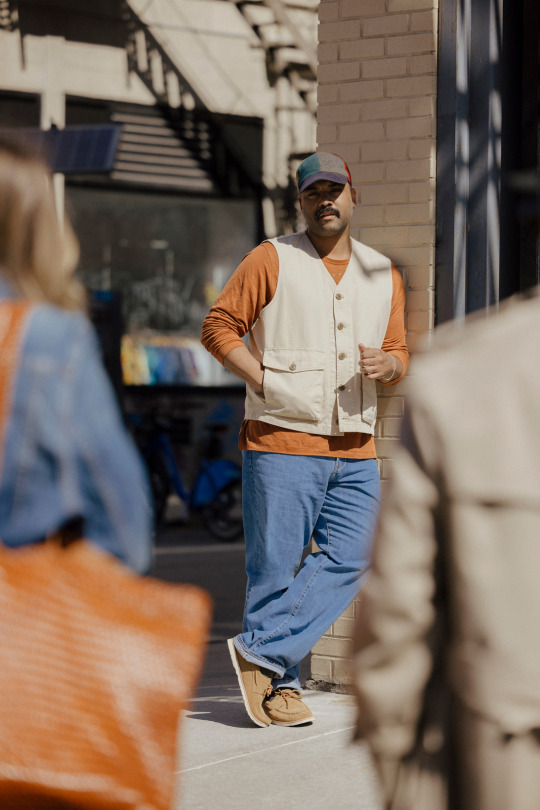
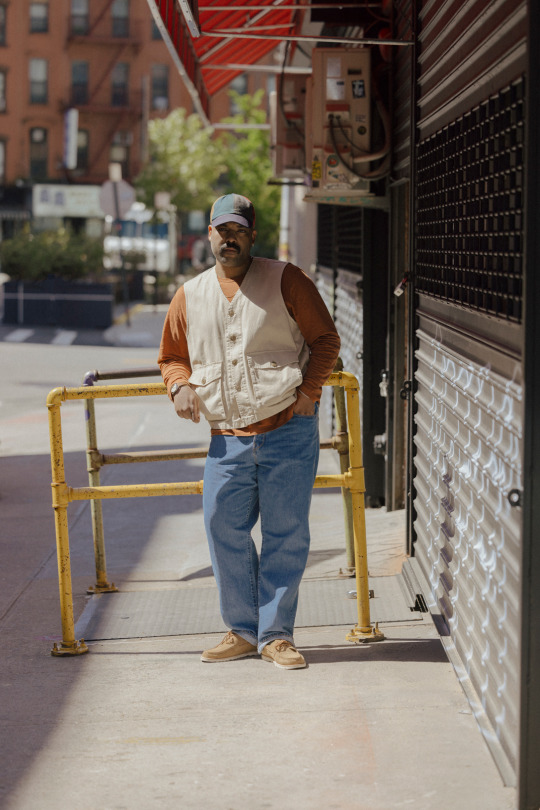









0 notes
Text
5 Local Players to Watch Out for in the Big Bash League in 2023-2024
Big bash league
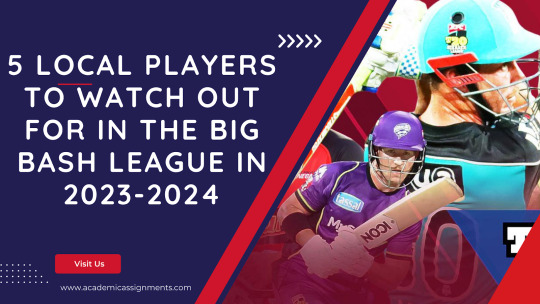
Australia’s top T-20 franchise league, The Big Bash League, is back with its thirteenth edition and how. This year’s edition has already showcased the return of some big-name international players and some exciting young local players who have shown much promise either in the previous editions of the league or in Australia’s domestic competitions.
While superstars such as Rashid Khan and Harry Brook will be missed, this edition of Australia’s premier T-20 franchise league promises a wonderful mix of experience and freshness, as well as proven international performers and young guns.
In this article, we will look at five local upcoming stars who are expected to dazzle with their exceptional skills. To ensure that you can peacefully enjoy the ongoing Big Bash competition without worrying about your class assignments, we are bringing you top-notch dissertation writing and other academic services that you will absolutely love.
5 Young Australian Players Who Can Light Up the Ongoing Big Bash League
Ever since the return of the Big Bash League for 2023-2024, there has been much buzz around young talents who have the potential to dethrone established names, such as Alex Hales, Glenn Maxwell, and Sean Abbott, to name a few. Here are five names to watch out for in this six-franchise competition:
Jack Wood:
Jack Wood previously featured in Big Bash as a replacement for Mitchell Swepson in 2020 and again in 2022. This year, he has been given a full contract by Brisbane Heat. He has already made a name for himself as a hard-hitting batsman and a crafty left-arm wrist spinner. Wood had a successful outing as a bowler with Ipswich-Logan in 2019-2020, fetching 28 wickets. He was also the highest run-getter in Australia’s domestic Max T20 competition in 2023, accumulating a total of 317 runs in 6 matches at a remarkable strike rate of almost 167. This year, he is expected to deliver with both the bat and the ball, given his red-hot form.
MacAlistair Wright:
Mac Wright is a leg spinner and a dependable middle-order batsman who plays for the Tasmania under-23 side. His Big Bash stats are certainly not stunning. Before the 2023 edition, he scored 351 runs in 15 matches at a decent strike rate of 122 and took one wicket at an economy rate of 10.60. But he has had a fine start to the 2023 edition, scoring 152 runs in 3 matches at a 50+ average and a 136+ strike rate. You should keep an eye out for this young allrounder, given the start he has had.
Ollie Davies:
Power-hitter Ollie Davies started his Big Bash journey in 2020 with a decent outing – displaying a rare combination of explosiveness and finesse. Before 2023, he scored 604 runs in Big Bash at an average of 23, with three half-centuries and a top score of 65. In a recent players’ poll conducted by Cricket Australia before the start of the marquee event, in which 35 players voted, Ollie received 3% voting in favor of becoming the player of the tournament.
Sam Harper:
Sam Harper is an explosive wicketkeeper-batsman who had a memorable outing in the 2022-2023 Big Bash season. He has been a reliable performer for all teams he represented with the bat and gloves behind the wicket during his first-class career. Once touted as one of the brightest talents in Australia, he is yet to set the stage alight, but this could be his breakthrough season.
Nick Hobson:
Nick Hobson, a stylish left-handed batsman, will be seen in Perth Scorchers jersey colors in the 2023-2024 Big Bash league. Before the 2023 season, Hobson scored 268 runs in the competition with a highest score of 46. Hobson has captained the Claremont-Nedlands side in domestic T20 competitions and has been their batting mainstay at the top. While he has not replicated his domestic cricket form in Big Bash, he could prove naysayers wrong with a stellar outing.
Conclusion
The current season is already underway, and we hope many new stars will emerge who will rule T-20 domestic, international, and, indeed, franchise cricket for years to come. Do let us know who your favorite is in the comments below.
And before we sign off, here’s a reminder once more. If you need help with dissertation writing, assignment, or career guidance, reach out to our experts at any time. We’ll be more than happy to help.
0 notes
Text
Unveiling the Versatile Talent of Hawthorne James
Hawthorne James, a name synonymous with versatility and excellence in the world of entertainment, has captivated audiences with his remarkable talent across various mediums. From the silver screen to the small screen and the stage, James has established himself as a force to be reckoned with, leaving an indelible mark on the industry. In this blog post, we dive into the multifaceted career of Hawthorne James, celebrating his contributions and exploring the depth of his artistry.
The Journey Begins: Early Life and Passion for Acting
Born and raised in Chicago, Illinois, Hawthorne James discovered his passion for acting at an early age. As a young boy, he found solace in the world of storytelling and was drawn to the magic of performance. This passion led him to pursue a career in acting, enrolling at the prestigious Goodman School of Drama.
Breakthrough on the Big Screen: Iconic Roles and Unforgettable Performances
Hawthorne James gained widespread recognition for his exceptional portrayal of iconic characters on the big screen. One of his most memorable performances came in the critically acclaimed film "Speed" (1994), where he portrayed the menacing villain, Sam. James brought a magnetic intensity to the role, leaving audiences on the edge of their seats.
Another notable performance came in the cult classic "The Five Heartbeats" (1991), where James showcased his versatility by portraying a struggling musician caught in the whirlwind of fame and fortune. His portrayal was both captivating and emotionally charged, solidifying his reputation as a skilled actor.
Television Triumphs: From Drama to Comedy
While James has made a significant impact on the silver screen, he has also graced the small screen with his exceptional talent. His versatility shines through in his television performances, effortlessly transitioning between dramatic and comedic roles.
One of his standout television appearances came in the hit series "The Shield," where he portrayed the complex character of Big Antwon Mitchell. James brought a nuanced depth to the role, earning critical acclaim for his portrayal of a drug lord with conflicting motivations
In addition to his dramatic roles, James has showcased his comedic prowess in popular sitcoms such as "The Parkers" and "Martin." His impeccable timing and ability to deliver a punchline with finesse have garnered him a loyal fan base that appreciates his diverse range.
The Stage: Commanding Presence and Artistic Excellence
Beyond his achievements in film and television, Hawthorne James has also made a significant impact on the theatrical stage. His commanding presence and undeniable talent have earned him accolades and recognition in the world of live performance.
Whether it's a classic Shakespearean play or a contemporary production, James's stage performances are marked by his exceptional range and ability to captivate audiences. His dedication to his craft is evident in every role he takes on, breathing life into characters and leaving a lasting impression.
A Legacy of Excellence: Inspiring Future Generations
Hawthorne James has not only achieved great success in his own career but has also inspired aspiring actors and artists around the world. His dedication, versatility, and commitment to his craft serve as a testament to the power of pursuing one's passion.
Through his exceptional body of work, James has opened doors for artists of all backgrounds, proving that talent and perseverance can break barriers and transcend boundaries. His journey is a testament to the importance of representation and the impact that a single individual can have on an entire industry.
Hawthorne James's remarkable talent, versatility, and unwavering dedication have firmly established him as a formidable presence in the world of entertainment. From his breakthrough roles on the silver screen to his captivating performances on the small screen and the stage, James continues to leave an indelible mark on the industry.
As we celebrate his contributions and admire his artistry, we are reminded of the power of storytelling and the ability of a single individual to inspire and uplift. Hawthorne James's legacy serves as a beacon of hope for aspiring artists, showcasing the limitless possibilities that await those who dare to dream and pursue their passions with unwavering determination.
1 note
·
View note
Text
Few Birdies, but One Double Bogey, on the Shortest-Ever U.S. Open Hole
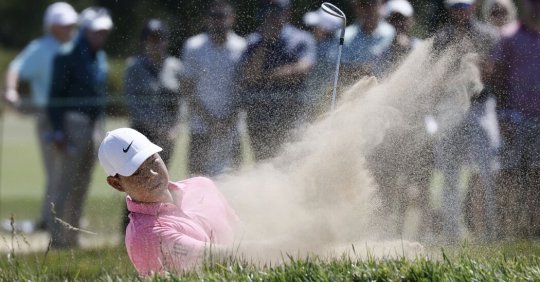
At 81 yards, the par-3 15th hole at Los Angeles Country Club on Saturday was the shortest hole in the history of the U.S. Open.Only a golfer can fully grasp the mental torment that such a bite-size challenge poses, but here is one way to understand the situation: No one likes a hole where it’s easier to throw the ball onto the green than it is to hit it there with a golf club.Add to the third-round setting a severely sloped 15th green; three massive, menacing bunkers surrounding the target area; and knotty, knee-high grass all around. And — oh, yes — the approach shot is uphill, and there is a gusty wind at the players’ backs.Step right up, who wants to go first? How about you, Brooks Koepka, five-time major champion?Didn’t Koepka suggest earlier this week that L.A. Country Club might be too easy? He said he worried about a “birdiefest.” Maybe he had a hole less than 100 yards in mind. (The old record for shortest U.S. Open hole was 92 yards, at the 2010 event.)Koepka was three under par for his Saturday round and firmly in the top 10 when he stepped to the 15th. But his tee shot had none of the touch required and soared to the back of the green. His first putt was way short. His next putt was way long. The third putt just plain missed the hole. Koepka tapped in for a double bogey and is now extremely unlikely to win a sixth major at this year’s Open.Who’s next? Don’t be shy.Next came Tom Kim, the hottest golfer in the early wave of players on Saturday, to the 15th tee. Kim made seven birdies as he tamed 5,637 yards of L.A.C.C. terrain in his first 14 holes. He had just made par at the fearsome 627-yard, par-5 14th hole.So, really, how hard could an 81-yard hole be?Trying to play with finesse, Kim deftly flipped a tidy little wedge. One problem: It was about two yards short of the green and trundled backward in a yawning bunker. His blast from the sand bounded to the back of the green, 22 feet from the hole. Two putts and one bogey later, Kim walked away shaking his head as he glared over his shoulder at the 15th green.After his round, Kim summed up the diabolical, tiny test presented on Saturday by the historic 15th hole.“If you’re long, you’re dead,” he said. “If you’re short, you’re dead. You don’t want to bail out left because then you have a 40-footer down the hill. A bogey from 80 yards isn’t great stats-wise, but, you know, a double bogey is definitely in play there.”Kim finished the day at three under par for the tournament and is still in contention.Bryson DeChambeau, golf’s mad scientist, looked very determined during his time on the 15th tee. He did not even flinch when he was almost beaned by an errant shot from the 14th fairway by a fellow competitor, Keith Mitchell. DeChambeau pitched a wedge to 10 feet and made par.“I’m the happiest man alive that I hit that green,” he said. “Super happy.”DeChambeau said he chose a 60-degree wedge and teed his golf ball extra high to create more spin and loft.“Very difficult, demanding shot,” he added. “Par is a great score.”Even if it’s only 81 yards?“I’d rather it be longer tomorrow,” said DeChambeau, who finished at three under par.The 15th hole did not play as one of the most difficult holes on the golf course on Saturday. But it seems a surprise that the scoring average on the hole was 2.92 with 11 birdies, four bogeys and one conspicuous double bogey in the field of 65.Forty-nine of the best golfers in the world made par, and no better, on an 81-yard hole. Then again, as is often said, golf is a game of opposites. For example, you must hit down on the ball to make it go up. So in that way, the 15th hole in the third round of the 2023 national golf championship was, perhaps, perfect.Shane Lowry, the 2019 British Open champion, may have said it best.“It was different, and that’s interesting,” he said with a smile. “Different is OK. But I had a plan. The plan was par.” Source link Read the full article
0 notes

